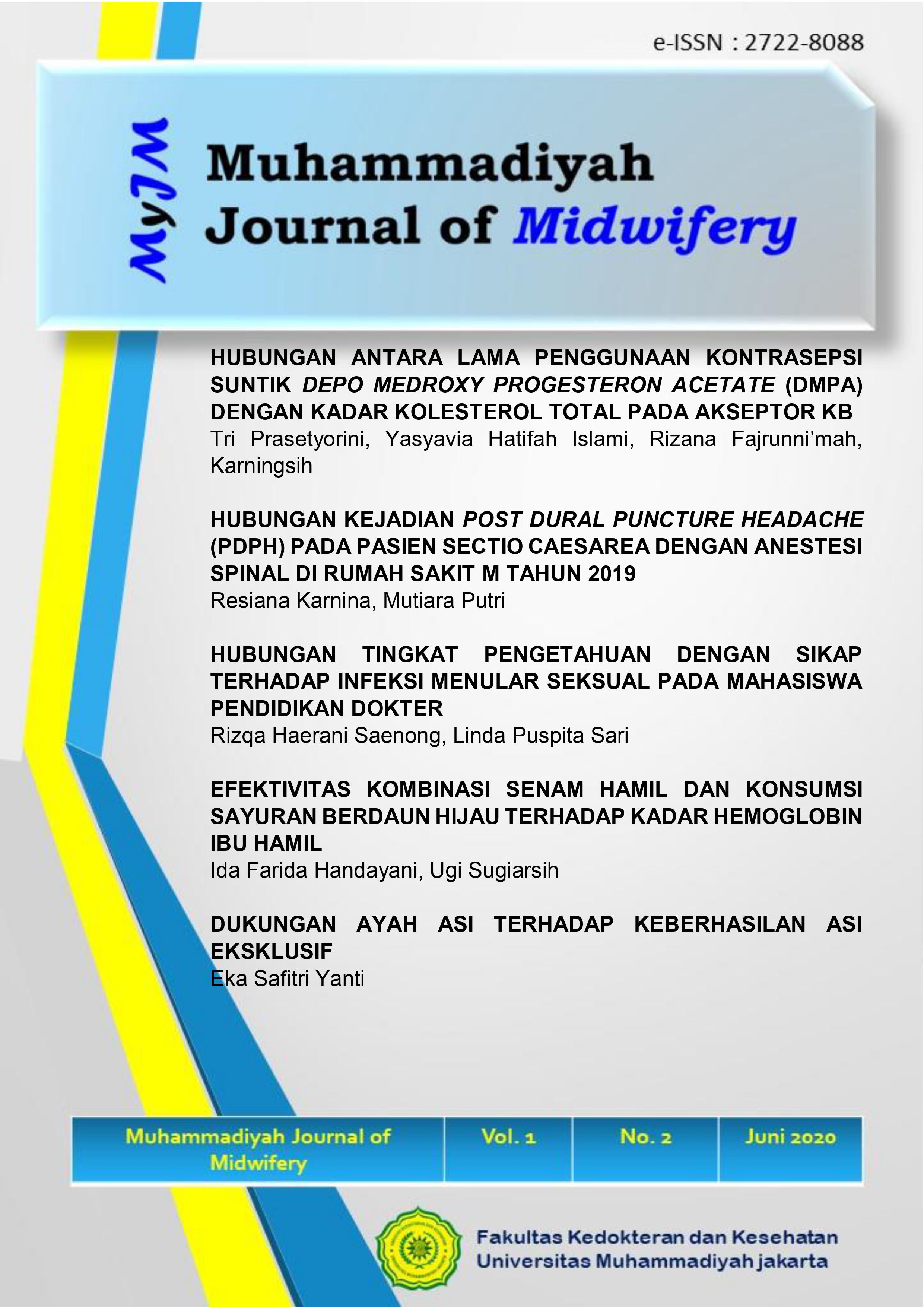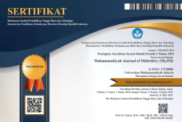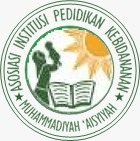Dukungan Ayah ASI terhadap Keberhasilan ASI Eksklusif
DOI:
https://doi.org/10.24853/myjm.1.2.67-74Keywords:
ASI Eksklusif, Dukungan Ayah, MenyusuiAbstract
Latar Belakang: Menyusui merupakan masa yang tidak mudah bagi seorang ibu. Harapan seorang ibu tentunya dapat menyusui secara penuh dalam 6 bulan pertama kehidupan bayinya. Namun sayangnya, ibu menyusui sering menghadapi berbagai masalah dalam perawatan bayi yang mengakibatkan terganggunya pemberian ASI seperti stress karena belum beradaptasi dalam perannya menjadi seorang ibu, atau karena tekanan dari lingkungan sekitarnya. Peran pasangan sangat penting dalam membantu ibu mengatasi masalah-masalah yang mungkin timbul. Dukungan pasangan dapat membantu ibu terutama dalam koping ibu dalam menangani stress yang mungkin timbul saat menyusui. Tujuan: Tujuan dari penelitian ini adalah untuk mengetahui dukungan ayah ASI berupa finansial, fisik maupun emosional terhadap keberhasilan ASI eksklusif pada masa antepartum, intrapartum dan masa menyusui. Metode: Metode penelitian ini menggunakan desain cross sectional yang dilakukan di Desa Tanjung Gunung Kabupaten Bangka Tengah Provinsi Kepulauan Bangka Belitung. Penelitian dilakukan kepada 35 pasangan suami istri yang memiliki bayi usia 6 bulan hingga 1 tahun. Hasil: Hasil analisis statistik didapatkan bahwa tidak terlihat hubungan yang signifikan antara dukungan ayah (finansial, fisik dan emosional) yang diberikan pada masa antepartum (p=0,285), intrapartum (p=0,730) hingga masa menyusui (p=0,282) terhadap keberhasilan ASI eksklusif. Walau demikian, dukungan ini menjadi bermakna jika ayah memberikan dukungan sepanjang masa kehamilan hingga 6 bulan masa menyusui tanpa ada satu periode pun yang terlewat (p=0,013). Kesimpulan: Hal ini memperlihatkan bahwa dukungan ayah (finansial, fisik dan emosional) harus dilakukan sepanjang masa antepartum, intrapartum dan masa menyusui untuk dapat menentukan keberhasilan ASI eksklusif.References
Kementerian Kesehatan RI. InfoDATIN: Situasi dan Analisis ASI Eksklusif. Jakarta:; 2014.
Dinas Kesehatan Provinsi Kepulauan Bangka Belitung. Profil Kesehatan Provinsi Kepulauan Bangka Belitung Tahun 2018. Pangkalpinang:; 2019.
Kementerian Kesehatan Republik Indonesia. Profil Kesehatan Indonesia Tahun 2019. Jakarta:; 2020.
Rempel LA, Rempel JK, Moore KCJ. Relationships between types of father breastfeeding support and breastfeeding outcomes. Maternal & Child Nutrition. 2017; 13: p. 1-14.
Vaaler ML, Castrucci BC, Parks SE, Clark J, Stagg J, Erickson T. Men's attitudes toward breastfeeding: findings from the 2007 Texas Behavioral Risk Factor Surveillance System. Maternal Child Health Journal. 2011; 15(2): p. 148-57.
Umami R, Puspitasari N. Peran Suami selama Proses Kehamilan sampai Nifas Istri. Thesis. Surabaya: Universitas Airlangga, Bagian Biostatistika dan Kependudukan Fakultas Kesehatan Masyarakat ; 2017.
Nurafifah D. Ayah ASI (Breastfeeding Father) terhadap Kejadian Postpartum Blues. In Rakernas AIPKEMA 2016; 2016; Lamongan. p. 75-80.
Ingram J, Johnson D. A feasibility study of an intervention to enhance family support for breastfeeding in a deprived area in Bristol, UK. Midwifery. 204; 20(4): p. 367-79.
Sherriff N, Hall V, Pickin M. Fathers' perspectives on breastfeeding: ideas for intervention. British Journal of Midwifery. 2009.
Tohotoa J, Maycock B, Hauck YL, Howat P, Burns S, Binns CW. Dads make a difference: an exploratory study of paternal support for breastfeeding in Perth, Western Australia. International Breastfeeding Journal. 2009; 15(4).
Nickerson LE, Sykes AC, Fung TT. Mothers' experience of fathers' support for breast-feeding. Public Health Nutr. 2012; 15(9): p. 1780-7.
Ogbo FA, Agho KE, Page A. Determinants of suboptimal breastfeeding practices in Nigeria: evidence from the 2008 demographic and health survey. BMC Public Health. 2015; 15(259).
Ogbo FA, Page A, Agho KE, Claudio F. Determinants of trends in breast-feeding indicators in Nigeria, 1999-2013. Public Health Nutr. 2015 Dec; 18(18).
Victor R, Baines SK, Agho K, Dibley MJ. Determinants of breastfeeding indicators among children less than 24 months of age in Tanzania: A Secondary analysis of the 2010 Tanzania Demographic and Health Survey. BMJ Open. 2013 Jan; 3(1).
Perera PJ, Ranathunga N, Fernando MP, Samaranayake WSaGB. Actual exclusive breastfeeding rates and determinants among a cohort of children living in Gampaha district Sri Lanka: A prospective observational study. International Breastfeeding Journal. 2012; 7(21).
Ogbo FA, Dhami MV, Awosemo AO, Olusanya BO, Olusanya J, Osuagwu UL, et al. Regional prevalence and determinants of exclusive breastfeeding in India. International Breastfeeding Journal. 2019; 14(20).
Dwinanda N, Syarif BH, Sjarif DR. Factors affecting exclusive breastfeeding in term infants. Paediatrica Indonesiana. 2018; 58(1).
Alemayehu T, Haidar J, Habte D. Determinants of exclusive breastfeeding practice in Ethiopia. Ethiopian Journal of Health Development. 2009 August; 23(1).
Sherriff N, Hall V, Panton C. Engaging and supporting fathers to promote breastfeeding: a concept analysis. Midwifery. 2014 Jun; 30(6).
Hidayati, F., Kaloeti, D. V., & Karyono. Peran Ayah dalam Pengasuhan Anak. Jurnal Psikologi. 2011; 9(1): p 1-10.
Downloads
Published
Issue
Section
License
(c) 2020 MyJM







